Aleksandra Kluczka, but you can also call her Ola, is a 23 years old member of AEGEE-Kraków. She is currently CD assistant, content manager of the Y vote 2014 project and member of the pool of representatives of AEGEE-Europe. She studied International Trades and International Relations and she has been a member of AEGEE-Kraków since october 2009, covering the position of Vice President and Fundraiser and coordinating several local activities. She’s running for a position in the Comité Directeur with a preference for External Relations (including European Institutions & fundraising) and Projects & Working Groups.
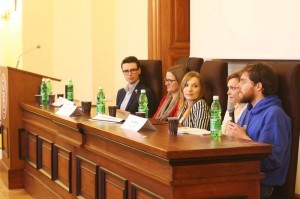 The AEGEEan: Do you consider yourself as a team player?
The AEGEEan: Do you consider yourself as a team player?
Aleksandra: I definitely perceive myself as a team player and this is what I usually hear from people working with me in different teams. I believe a good team is a basis on which you can build later on, which makes it possible to achieve common goals. Personally I enjoy working with people. I gain energy, get the best ideas and motivation and I am most efficient, while working in a group. I have empathy. I believe in the sentence ‘first seek to understand, then to be understood’, to quote Stephen Covey. If I am elected for the CD, I will do my best to ensure a good environment in the team and I will give a lot of attention to teambuilding.
The AEGEEan: If you are elected CD Member, what will be the first thing you will do?
Aleksandra: If I am elected, I believe the first thing we should do with the new team is a solid teambuilding. People can have amazing ideas and skills and work great as individuals, but if they do not become a true team, striving for the same goals, going in the same direction, they will not reach their full potential and contribute to the organisation to the biggest extent. That is why I believe the TEAM is so important. Therefore, even before the term starts, I think we should take some days specially for teambuilding with a professional trainer. Also, we should start working on our strategy and goals we want to achieve with the team as soon as we are elected. It seems that one year term is a long period, but in fact it passes very quickly and as we know, it takes a long time from the creation of an idea to its implementation
The AEGEEan: How will you involve AEGEE members to catch opportunities Liaison Officers provide to the members?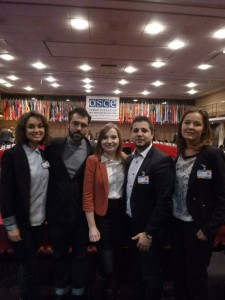
Aleksandra: I think the first step is to acquaint our members better with the organisations Liaison Officers cooperate with. We should have more workshops on statutory events explaining the work of organisations such as United Nations, OSCE, OECD, etc., in a youth-friendly way: their relevance for AEGEE, the benefits they provide and the impact we can have. Then, we should share on a bigger scale the opportunities these organisations provide, information about conferences, internships, scholarships and other initiatives, but also the processes AEGEE is involved in. There are plenty of opportunities, just to give an example of fully funded United Nations Alliance of Civilizations Summer School in New York. Information is key!
Currently I am a Youth Ambassador of Model OSCE and I support our Liaison Officer towards OSCE, Ermanno Napolitano (AEGEE-Milano), on bringing this organisation and its opportunities closer to our members. I can already invite you to our workshop at Agora Patra explaining the functioning of Organization for Security and Co-operation in Europe and how AEGEE is involved there. We will collect your ideas for an AEGEE side-event that will be organised during the Human Dimension Implementation Meeting of OSCE in Warsaw this year and let you know how you can get involved. We will also update you on the state of youth policies there and I will tell you more about the Youth Action Plan that is being developed, waiting for your ideas!
The AEGEEan: Liaison Officers and Policy Officers are not so known in the Network, especially among non- European level active members. How will you make Liaison Officers and Policy Officers ‘more famous’?
Aleksandra: I don’t think we should make Policy Officers and Liaison Officers ‘more famous’, but we should definitely keep updating the Network more clearly about the purpose of their work. This question is quite related to the previous one. I do see the need to acquaint our members more with the topics and areas Policy Officers and Liaison Officers take care of, which can be done by, again, more interactive workshops during statutory events, online hangouts with questions & answers sessions, etc. However, I am aware that making members already active on the European level more familiar with the work of POs and LOs is not too difficult. The biggest challenge is how to pass this information to all members on the local level. I think the responsibility rests also on the board members. It would be good if in each board there was one person responsible for informing the members on the developments in AEGEE-Europe, also regarding the achievements and opportunities provided by the work of Liaison Officers and Policy Officers. I believe that the new CD should pay even more attention to informing, but also asking for opinions of board members of locals and improving communication channels with them.
The AEGEEan: You said that ‘ideally we could have an AEGEE representative appointed towards each national youth council’. How will you manage to do that?
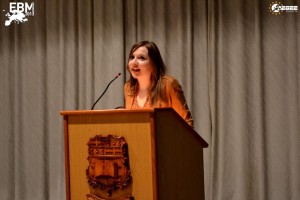 Aleksandra: I think we should adopt common AEGEE strategy towards national youth councils. We should do proper research and create a database with all national and regional youth councils in Europe, check and keep track of which of the antennas are already involved in those councils and encourage other locals to participate. In order to achieve that, we should communicate properly to our members the specifics of youth councils, the impact they have in the youth policy field and the benefits resulting from the membership. Once AEGEE locals join national youth councils as member organisations, a common representative of AEGEE towards the national youth council in a particular country could be chosen.
Aleksandra: I think we should adopt common AEGEE strategy towards national youth councils. We should do proper research and create a database with all national and regional youth councils in Europe, check and keep track of which of the antennas are already involved in those councils and encourage other locals to participate. In order to achieve that, we should communicate properly to our members the specifics of youth councils, the impact they have in the youth policy field and the benefits resulting from the membership. Once AEGEE locals join national youth councils as member organisations, a common representative of AEGEE towards the national youth council in a particular country could be chosen.
I believe that involvement in national youth councils can be of great benefit for AEGEE members and locals. My antenna, AEGEE-Kraków is a member of Polish Council of Youth Organisations (PROM) and I used to be the representative of my local towards it. This experience made me realise, how many opportunities it provides for member organisations. Member organisations have the ability to shape youth policies in their country and take part in consultations regarding it, start new initiatives and projects with other member organisations, get involved in the working groups, Structured Dialogue and they have access to interesting conferences or trainings.
The AEGEEan: How will you create a regional pool of trainers?
Aleksandra: This idea would have to be discussed with the team and the Academy for sure. Regional pools of trainers don’t necessarily have to be official bodies at first. We should start with creating databases of people with training experience based in different parts of our AEGEE Network. The reasoning behind this idea is the fact that many locals do not have the capacity or human resources to organise a Local Training Course for their members. I come from a local that organises 4 LTCs per year – two for new members and two Management Training Courses for future project coordinators and I realised how unbelievably empowering such events are for the members and how crucial they are for the development of the organisation as a whole. The biggest impact AEGEE can ever have is on its members and LTCs are in my opinion the first step to empower them.
The AEGEEan: Who is going to take care of the online trainings?
Aleksandra: In my programme I mentioned not only the fields I would like to be the main responsible for if being elected to the CD, but also a general vision and issues that I think are crucial for the further development of AEGEE. Some of the other candidates mentioned in their applications the will to work on online trainings and I am sure they will do a great job with that. Of course I am willing to support them in this process. Online trainings would ensure that every AEGEE member has the access to training opportunities. Not everyone has the capacity in terms of time or finances to attend an international training course, therefore online trainings would be an important step for empowering a bigger amount of our members and giving them tools for personal development.
The AEGEEan: Can you explain a bit more about the concept of a secretariat?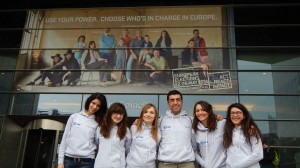
Aleksandra: In my opinion, the main purpose of creating the Secretariat is to professionalise our organisation and diminish the administrative workload CD members currently have, enabling them to devote more time to strategic planning and developing new ideas for the organisation. Implementation of a Secretariat means employing people to take care of some aspects of the organisation’s administration, if AEGEE receives a grant for this purpose. At the same time, leading the organisation and choosing directions of development would stay within CD’s competences, which would still consist of volunteers. There are many variants of a Secretariat, AEGEE should adopt a model best suiting its needs if the new CD decides to continue the efforts of the current CD in this matter.
The AEGEEan: Knowing that fixed positions in the Comité Directeur ideally do not exist, LTC/RTC and online trainings are more Network Director related tasks. How do you think you, as possible external director, could be involved?
Aleksandra: According to the CIA and the real workload in the CD, fixed positions do not exist. Of course, each board member has some focus areas and preferred tasks, but in fact each of them needs to develop a big dose of flexibility and undertake different kind of tasks, both internal and external. My preferred official position is External Relations indeed, but I would still like to support other fields, such as development of thematics and trainings.
The AEGEEan: You are the Content Manager of Y Vote 2014 project. What did you learn by this experience? How do you think you can apply your knowledge to your term in the Comité Directeur?
Aleksandra: Y Vote 2014 has been one of the most important learning experiences of my life. We started working on the project already in January 2013, having a meeting in Brussels, where we developed the concept of the campaign and the activities. Since then I became the Content Manager of the project, and as I mentioned in my candidature, I was responsible for developing the Students’ Agenda for Europe and the content of nine Y Vote conventions taking place between September 2013 and April 2014. I was coordinating the work of the content teams, the communication with hosting locals and supervising the logistic preparations. It was a great opportunity to develop my training, facilitation and public speaking skills during the conventions, as I attended seven of them as a trainer. I have facilitated panels with Members of the European Parliament and their assistants, as well as with other external speakers and experts. While preparing the conventions, I have broadened my knowledge about the functioning of the EU as well. Finally, I have learnt how to work hard under a big pressure of time in an international team spread around Europe. I realised even more, how important proper communication is and the necessity of a solid teambuilding. I believe that the above mentioned experiences are extremely relevant for the work in the CD. As we all know, during the term CD members work under a huge pressure of time, coordinate many processes in the organisation parallelly, work with AEGEE members on different initiatives, represent the organisation externally, facilitate discussion panels, give trainings and that’s just a tip of the iceberg. I believe that my experience and skills makes me capable of managing all those challenges. With the Y Vote 2014 project we wanted to empower and inspire young people to become multipliers of the project, to spread the passion for Europe and awareness about the impact of the EU on our daily lives. I hope we managed to have an impact on participants of our activities. The project has had a huge impact on myself. It motivated me to contribute to the European project even more, made me realise, what we are capable of in this organisation and that I want to devote my next year to contribute to AEGEE to the highest possible extent.
The AEGEEan: Do you already have any idea for a follow-up of Y Vote 2014 project?
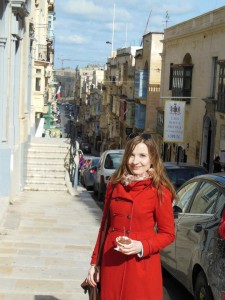 Aleksandra: I am very glad you asked. First, we need to finalise the Y Vote 2014 and do the follow-up regarding the Students’ Agenda for Europe that was created by AEGEE members during Y Vote conventions in the past few months, consisting of recommendations for Members of European Parliament on topics relevant for youth. Before the European Parliamentary elections we will send it to all candidates to European Parliament to address the vision for Europe students have. Once we get the support for the ideas, after the elections we will keep reminding the newly elected MEPs, what they promised to young people. I believe we should not remember about Europe only once in 5 years, before the EP elections, but on a constant basis. I do not want to suggest a concrete vision for a project on spreading eurooptimism yet, as I would like to give the ownership to the future project team. But I believe such project should raise awareness of young people concerning the impact the EU has on our daily lives and the benefits coming from the European project.
Aleksandra: I am very glad you asked. First, we need to finalise the Y Vote 2014 and do the follow-up regarding the Students’ Agenda for Europe that was created by AEGEE members during Y Vote conventions in the past few months, consisting of recommendations for Members of European Parliament on topics relevant for youth. Before the European Parliamentary elections we will send it to all candidates to European Parliament to address the vision for Europe students have. Once we get the support for the ideas, after the elections we will keep reminding the newly elected MEPs, what they promised to young people. I believe we should not remember about Europe only once in 5 years, before the EP elections, but on a constant basis. I do not want to suggest a concrete vision for a project on spreading eurooptimism yet, as I would like to give the ownership to the future project team. But I believe such project should raise awareness of young people concerning the impact the EU has on our daily lives and the benefits coming from the European project.
The AEGEEan: Lately you attended a lot of Network Meetings. Was it because you were interested in the topics or because of CD campaign?
Aleksandra: Indeed, in the past few weeks I attended three Network Meetings – in Alicante, Leiden and Salerno. While deciding to go to them, of course the idea of CD campaign and preparations crossed my mind. But more importantly, I wanted to get to know better significant parts of our Network. I think it’s extremely important for a CD member to know the people, the needs and challenges the different parts of the Network are facing. Knowing the people personally is also very helpful for the purpose of good communication in the future. Apart from this, my role in NWMs was more active. In Alicante I was a trainer, leading a workshop about conflict resolution, facilitating some sessions and performing a session about the upcoming European Parliamentary elections and the structure of the EP (together with Léa Charlet from AEGEE-Paris). Also in Salerno and Leiden I led workshops about EP elections.
Written by Erika Bettin, AEGEE-Venezia

